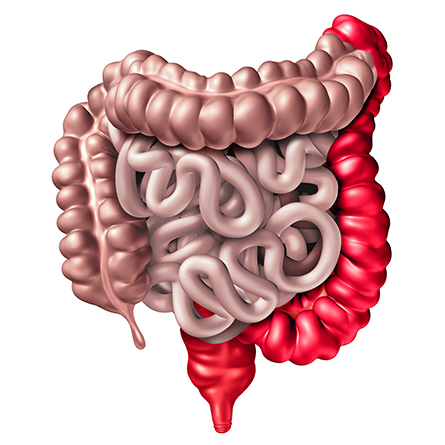Proteases implicated in ulcerative colitis
Ulcerative colitis, or UC, is a form of inflammatory bowel disease characterized by chronic and relapsing large intestine inflammation. Genetics account for only a minority of UC cases; hence, to develop treatments, researchers need to understand better the environmental contributions to this condition.
Gut microbes are in perpetual contact with the gastrointestinal tract, so they comprise important but poorly defined environmental variables contributing to UC development. Many studies have reported changes in gut microbiome composition in patients with UC compared to healthy individuals. While that suggests a potential role for gut microbes in UC pathogenesis, researchers have yet to pinpoint the causative microbes and associated bacterial proteins.

Dennis Wolan’s lab at Scripps Research is interested in identifying small-molecule activators and inhibiting bacterial enzymes involved in proliferation of human disease. Wolan said he was curious about what bacterial enzymes of the microbiome contribute to UC development.
“Many publications have focused on the role of the microbiome in both health and disease states,” he said. “Most of these were focused on the taxonomical and phylogenic differences in the microbiome. But what about the associated bacterial proteins? What proteins are these gut bacteria making in disease conditions, and how are these interacting with the human body?”
One protein of interest was serine proteases, a type of proteolytic enzyme that cleaves peptides at the serine amino acid. Researchers long have recognized that they coordinate many physiological processes and play key roles in regulating the inflammatory response. Previous studies have suggested increased proteolytic activity in microbial samples harvested from people with inflammatory disorders such as UC and Crohn’s disease.
Peter Thuy–Buon, a graduate student and later a postdoc in the Wolan lab, led a project to study differential protein expression in healthy and UC fecal samples. He and the team described the project in a recent paper in the journal Molecular & Cellular Proteomics. In addition to standard mass spectrometry, Thuy–Buon used a small molecular approach called affinity-based proteomic profiling to target and enrich for different types of proteases in the fecal samples.
“We showed that there were 176 discrete host and microbial protein groups differentially enriched between healthy and UC patients,” Wolan said. “Furthermore, further enrichment of these proteins showed significantly higher levels of serine proteases in UC patients.”
This finding has inspired exciting future research questions. For example, are elevated serine proteases the driver of UC or merely the effect of UC disease progression?
“There is a lot of exciting work to be done using these findings,” Wolan said. “Future molecular studies should focus on how serine proteases might be contributing to UC and whether their levels can be manipulated to modify disease progression.”
Functional proteomics has shown the potential role of serine proteases in UC. Future steps will include drug discovery and design of small-molecule regulators of bacterial enzymes.
Wolan said, “Ultimately, the moderation of microbiome distribution in UC via external small-molecule intervention can serve as a foundation for UC prevention and treatment.”
Enjoy reading ASBMB Today?
Become a member to receive the print edition four times a year and the digital edition monthly.
Learn moreGet the latest from ASBMB Today
Enter your email address, and we’ll send you a weekly email with recent articles, interviews and more.
Latest in Science
Science highlights or most popular articles

Building a career in nutrition across continents
Driven by past women in science, Kazi Sarjana Safain left Bangladesh and pursued a scientific career in the U.S.

Avoiding common figure errors in manuscript submissions
The three figure issues most often flagged during JBC’s data integrity review are background signal errors, image reuse and undeclared splicing errors. Learn how to avoid these and prevent mistakes that could impede publication.

Ragweed compound thwarts aggressive bladder and breast cancers
Scientists from the University of Michigan reveal the mechanism of action of ambrosin, a compound from ragweed, selectively attacks advanced bladder and breast cancer cells in cell-based models, highlighting its potential to treat advanced tumors.

Lipid-lowering therapies could help treat IBD
Genetic evidence shows that drugs that reduce cholesterol or triglyceride levels can either raise or lower inflammatory bowel disease risk by altering gut microbes and immune signaling.

Key regulator of cholesterol protects against Alzheimer’s disease
A new study identifies oxysterol-binding protein-related protein 6 as a central controller of brain cholesterol balance, with protective effects against Alzheimer’s-related neurodegeneration.

From humble beginnings to unlocking lysosomal secrets
Monther Abu–Remaileh will receive the ASBMB’s 2026 Walter A. Shaw Young Investigator Award in Lipid Research at the ASBMB Annual Meeting, March 7-10 in Washington, D.C.

